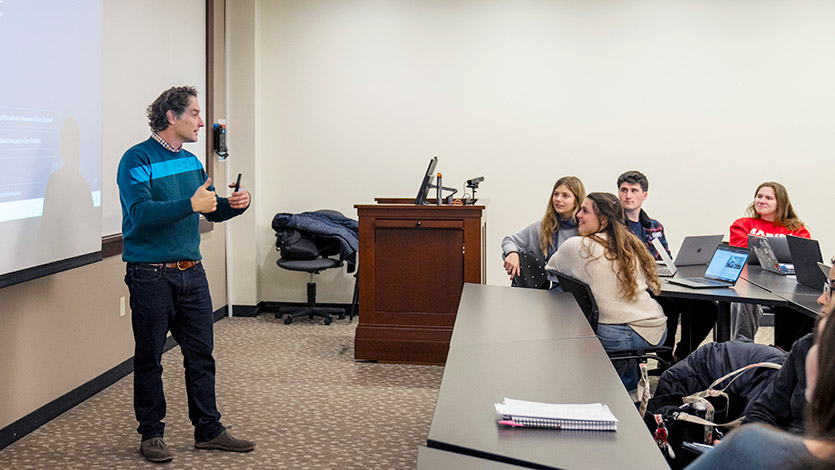Marist+AI Initiative Looks at How to Responsibly Harness the Power of AI

November 19, 2024 — The impact of artificial intelligence (AI) on our lives is increasing exponentially each day.
In order to address the opportunities and challenges of a rapidly evolving technological world, President Kevin Weinman has initiated Marist+AI, a community-wide collaboration intended to proactively shape an institutional approach to AI and guide Marist’s efforts to responsibly harness its potential.
Spearheading this work is a steering committee led by Dr. Kevin Gaugler, Assistant Dean of the School of Liberal Arts and professor of Spanish, and Diane Hart, Associate Vice President of Special Projects and Innovation, as well as two working groups focused on academics and operations.
“AI will affect everything — the way that we learn, the way that we teach, the way that we work, the way that we live,” Hart said. “We want to make sure that everybody has the opportunity to engage with us, so the response reflects the perspectives of our community.”
The Marist+AI steering committee has already kicked off its work, which has included collaboration with the Center for Teaching and Learning and three listening sessions this fall, one each aimed at faculty, staff, and students. The sessions were a chance for the Marist community to become part of the conversation, offering valuable information about their interests in and concerns about AI, as well as ways in which they already incorporate AI into daily work and life.
“A message that we heard pretty clearly was that people want to understand more about AI,” said Hart. “They want to learn what the tools are, how to evaluate them, and how best to use them.”
As this technology develops, ethical matters will be a top concern.
“We’re definitely putting our ethical foot forward first,” Gaugler said. “It’s a good starting point toward thinking about the relationship between this new technology and Marist as an institution of learning.”
As the committee begins to develop best practices and ethical guidelines, it will do so with an eye toward an integrative approach to support the goals of enhancing academic vibrancy, centering student success, and creating an expansive community laid out in Marist 100.
Students have been involved in this initiative since its outset, with Christian Sarmiento '25 and Owen Whelan '27 serving, respectively, on the operations and academic working groups. These groups aim to explore AI’s impact at a deeper level, getting into the granular details of its potential impacts.
Christian and Owen both say that having the student perspective in these conversations is vital to help move into Marist’s future with AI.
“If the real world is going to involve AI as a tool in our professional lives, here would be the place to develop those skills for how to properly and effectively use it,” said Christian.
He added that fostering a collective sense of understanding and ethics in relation to AI is one of his principal concerns.
“We need to make sure the playing field is level,” he said.
Owen echoed Christian’s sentiments, and added that he is excited by the capacity and power of AI as a tool to help in teaching, learning, research, and other academic pursuits.
“I think the scope of academic work is going to expand due to AI,” he said. “It is important to have a shared sense of guidelines and standards as a starting point so we can truly focus on all the cool possibilities AI has to offer.”
Get Involved and Learn More About AI
There are many ways that Red Foxes across the Marist community can join the conversation.
On Wednesday, November 20, at noon, leading author and scholar Dr. Edward Watson will discuss the challenges and opportunities presented by AI during a talk in the Cabaret.
Watson’s book, Teaching with AI, is a practical guide that helps reimagine important aspects of academic and broader life with this new technology, including new forms of creativity, writing, and thinking. The book is divided into three sections: one on thinking with AI, one on teaching, and one on learning.
Marist students, faculty, and staff can access a free electronic copy of the book via the library.
“There are lots of resources out there, but we are featuring Dr. Watson’s book because it is succinct and clear and serves as a great starting point for a campus-wide conversation around AI and its implications,” said Gaugler.
Alumni are also encouraged to participate in this dialogue.
“If you’ve graduated from Marist and want to share what you’re doing in the field with AI, or if you have any thoughts, we would love to hear from you,” said Gaugler.
Above all, the leaders of the committee emphasize that the age of AI is here, and a responsible, creative, and ambitious approach to what lies ahead will help set Marist on a path of success.



